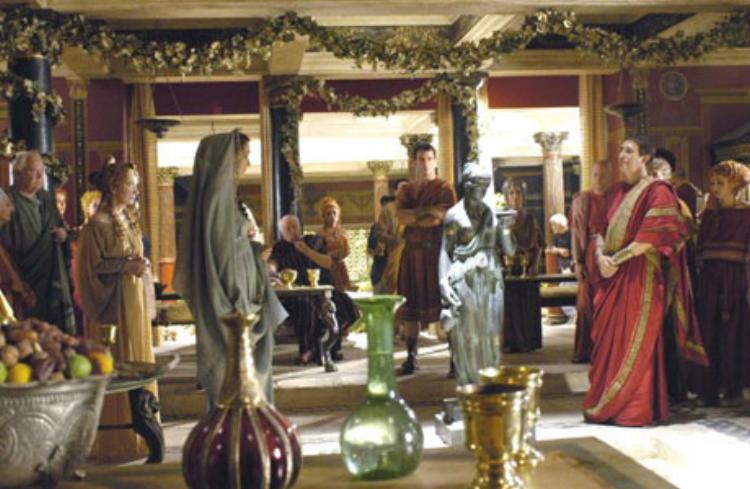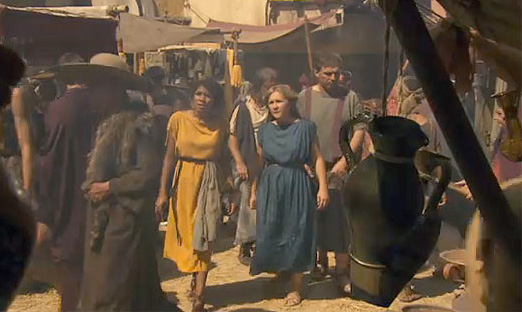The communism of antiquity, 6
by Alain de Benoist
This certainty that the Empire needed to collapse for the Kingdom to come explains the mixed feelings of the early Christians towards the barbarians. Undoubtedly, at first, they felt as threatened as the Romans.
Ambrose, Bishop of Milan, distinguished between external enemies (hostes extranei) and internal enemies (hostes domestici). For him, it was the Goths that Ezekiel was referring to when he spoke of the people of Magog. But, in the second stage, these barbarians, who were soon to be evangelised, became auxiliaries of divine justice. Christians could not admit that their fate was linked to that of a ‘Babylon of impudence’. That is why the Carmen de Providentia or the Commonitorium of Orentius are scarcely interested in other than the ‘enemies within.’ In the 3rd century, in his Carmen apologeticum, a Christian author, Comodian, speaks of the Germans (more precisely of the Goths) as ‘executors of God´s designs.’ In the following century, Orosius, in turn, affirms that the barbarian invasions are ‘God´s judgement’ that come ‘in punishment for the faults of the Romans’ (poenaliter accidisse). It is the equivalent of the ‘plagues’ Moses used to blame the Pharaoh.
On 24 August 410, Alaric, king of the Visigoths, after besieging Rome for several weeks, entered the city by night through the Porta Salaria. It was a converse patrician, Proba Faltonia, of the Anician family, who, after sending her slaves to occupy the gate, had it surrendered to the enemy. The Visigoths were Christians, and the spiritual and ideological solidarity bore fruit. The Anicians, of whom Amianus Marcellinus (XVI, 8) says that they were reputed to be insatiable, were known as fanatics of the Catholic party. The sack of Rome that followed was described by Christian authors with kindly strokes. Alaric’s ‘clemency’ was praised. Georges Sorel asked: ‘Were the vanquished guilty?’ St Augustine says of the Visigothic leader, he was God’s envoy and the avenger of Christianity. Oretius says that only one senator died and that it was his fault (‘he had not made himself known’), and that it was enough for Christians to make the sign of the cross be respected, and so on. ‘Such daring lies, says Augustin Thierry, were later admitted as indisputable facts’ (Alaric).
Around 442, Quodvulteus, bishop of Carthage, claimed that the ravages of the Vandals were pure justice. In one of his sermons, he tried to console a faithful member who had complained about the devastation: ‘Yes, you tell me that the barbarian has taken everything from you… I see, I understand, I meditate: you, who lived in the sea, have been devoured by a bigger fish. Wait a little: an even bigger fish will come and devour the one who devours, despoil the one who despoils, take the one who takes… This plague that we are suffering today will not last forever: in truth, it is in the hands of the Almighty’. Finally, at the end of the 5th century, Salvianus of Marseilles affirms that ‘the Romans have suffered their sorrows by the just judgement of God’.
In the 2nd century, the City had been invaded by foreign cults. A temple to the Great Mother had been erected on the Palatine Hill, where fanatici officiated. Moral contagion did the rest. ‘Through the gap opened in the barrier that closes the horizon of terrestrial life, they were going to penetrate all sorts of chimaeras and superstitions, drawn from the inexhaustible reservoir of the Oriental imagination.’ (Bouché-Leclercq). These were the bacchanalia, the rites with mysteries, the Isiac cult, the cult of Mithra, and finally, Christianity. The words ‘The last of his family’ were written in the tombs more frequently. Pompey’s line had disappeared in the 2nd century, and also Augustus’ and Maecenas’ lines.
Rome was no longer Rome; all the rivers of the East flowed into the Tiber. It was only much later, in the Renaissance, that Petrarch (1304-1374) observed that the ‘black epoch’ (tenebrae) of Roman history had coincided with the era of Theodosius and Constantine; while in northern Europe, in the early 16th century, Erasmus (c. 1469-1536) claimed, although he called himself a ‘militiaman of Christ’, that the true barbarians of ancient times, the ‘real Goths’, had been the monks and scholastics of the Middle Ages.


One reply on “Christianity:”
An academic paper written in more civilised times, on why interbreeding caused the decline and fall of the Roman Empire, can be read here.